Death Toll From Iranian Pilgrims at Hajj Rises to 11
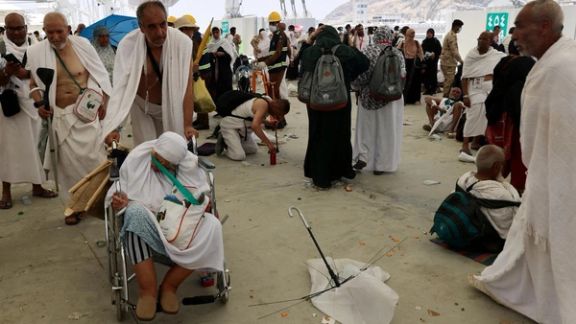
The death toll among Iranian pilgrims participating in this year's Hajj in Saudi Arabia has risen to 11 as extreme heat and crowding see fatalities mounting.

The death toll among Iranian pilgrims participating in this year's Hajj in Saudi Arabia has risen to 11 as extreme heat and crowding see fatalities mounting.
Pirhossein Koolivand, the head of the Iranian Red Crescent, confirmed on Tuesday that an additional 26 pilgrims are currently receiving medical treatment in Saudi hospitals in addition to those who have died at the annual religious event.
Koolivand said the pilgrims' health status is "good and suitable", claiming that medical staff dispatched from Iran to accompany pilgrims attended to over 11,000 cases.
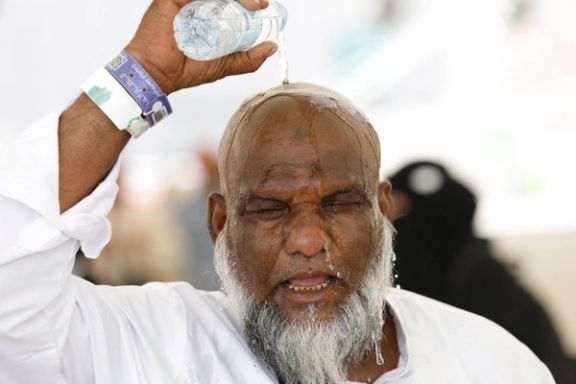
On Sunday, Mohammed Al-Abdulaali, a spokesman for Saudi Arabia's Health Ministry, said in one day, over 2,760 pilgrims experienced sunstroke and heat stress at the Hajj attracting around 1.8 million to Mecca in Saudi Arabia.
To combat the mass of yearly deaths that occur, Saudi officials have implemented several safety measures, such as climate-controlled environments and extensive medical services, mitigating the health dangers associated with the extreme heat.
Last year, the pilgrimage saw as many as 240 deaths, with temperatures soaring to about 48 degrees Celsius.
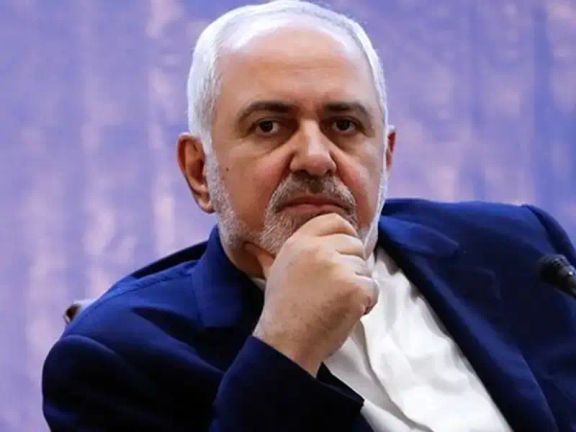
Iran's ex-foreign minister, Mohammad Javad Zarif, announced plans to support Masoud Pezeshkian, a so-called "reformist" presidential candidate, in an upcoming political roundtable on state television.
Zarif, who was Iran’s top diplomat from 2013 to 2021 and a key figure in the controversial nuclear deal negotiations, declared his intentions through a post on the social networking platform X.
The planned discussion is expected to touch on major national issues under a potential Pezeshkian presidency, though skeptics doubt significant change will occur if he were elected.
The event comes as Iran prepares for unexpected presidential elections on June 28 following the sudden death of President Ebrahim Raisi in a helicopter crash.
Critics fear that the roundtable may simply be another example of Iran’s political theater, aimed at maintaining the status quo under the guise of reform.
Skepticism about Pezeshkian’s potential for genuine reform is growing as he aligns closer to the narrative of the ruling theocratic regime. In a recent televised interview, he focused primarily on economic issues without touching on more contentious subjects such as foreign policy, the nuclear program, or the mandatory hijab law, leaving many supporters feeling disillusioned as the country cries out for change.
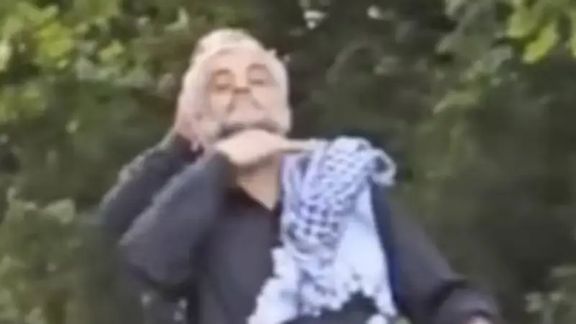
A US court has extended a temporary restraining order against Ramezan Soltan-Mohammadi, an employee of Iran's Interests Section in Washington, after he was seen threatening an Iranian protester last month.
Demonstrators against the Iranian government had gathered at a memorial service hosted by the Islamic Education Center (IEC) in Maryland, commemorating the deaths of President Ebrahim Raisi and Iran's foreign minister, Hossein Amir-Abdollahian, who died in a freak helicopter crash last month.
In a video posted on social media, Soltan-Mohammadi was seen making a death gesture at Siamak Aram, an activist who fled Iran in 2011.
After three sessions, the civil court in Maryland decided to extend the initial temporary order until the end of the year.
It prohibits Soltan-Mohammadi from contacting, threatening, or approaching Aram's residence and workplace, as stated by his lawyer on Instagram.
It is the latest in a string of attacks on Iranians abroad over the last two years, including attacks and plots against Iran International journalists.
Roya Boroumand, the Executive Director of Abdorrahman Boroumand Center for Human Rights and an expert witness at the court, told Iran International that this latest order carried significant implications.
“First, it sends a message to individuals and their superiors that they cannot act with impunity in any nation. While such threats may be allowed in Iran, this order ensures a record is established, deterring future threats against individuals. Past incidents have demonstrated that these threats can materialize, underscoring the necessity of this precautionary measure,” Boroumand said.
In August 2023, a Fox News Digital report disclosed a three-page letter from the GOP detailing mosques and centers in Maryland, Texas, Michigan, and Virginia with alleged links to the Iranian regime. The report asserted that the Islamic Education Center in Maryland received funding from the Alavi Foundation, which the Iranian government purportedly controls, and from Abolfazl Bahram Nahidian, an Iranian Imam based in Washington.
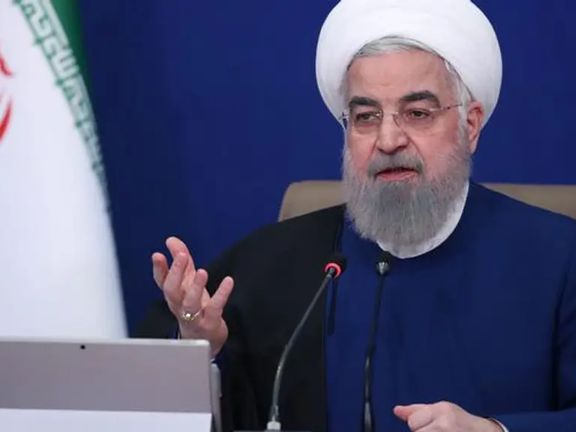
In a rebuke of state-run media practices, the office of Iran’s former President Hassan Rouhani has issued a letter of complaint to the head of the Islamic Republic of Iran Broadcasting (IRIB).
The letter demands fair airtime to counter "claims and accusations" made against Rouhani's administration during recent presidential debate roundtables, accusing the IRIB of perpetuating what it describes as "the illegal spread of lies and defamation".
"By law, the Electoral Commission should allocate a specific time for the absent party to defend themselves," the letter stated.
Rouhani's office criticized the IRIB for its historical bias and its disregard for "the observance of electoral ethics." The letter expresses hope that the state broadcaster will alter its course and allow Rouhani or his representatives to address the doubts and accusations.
The call for fairness comes in the wake of pointed critiques from conservative figures, including Tehran Mayor Alireza Zakani, during the first televised debate. On Monday night he pointed fingers at Rouhani’s government as the root cause of Iran's current economic strife.
However, many lay the blame in the hands of the late president, Ebrahim Raisi, whose tenure since 2021 led to the worst economic crisis since the founding of the Islamic Republic. His sudden death last month in a freak helicopter crash has led to a snap election on June 28.
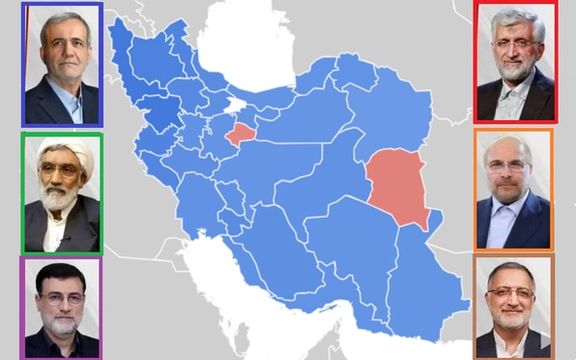
In the absence of independent election polling in Iran, multiple social media channels have launched their own ad-hoc polls, which reveal totally contradictory results depending on who the followers of each channel are.
Amid apparent voter apathy and anti-government sentiment among Iranians, some insights can still be gleaned from a combination of Google Trends analysis and social media polls with shifting interest in candidates and different results depending on the political orientation of social media followers of different channels.
Reformist groups prefer Masoud Pezeshkian, known as a 'moderate' politician, but exhibiting conservative tendencies during his election campaign. On the other hand, hardliners generally favor Saeed Jalili, a firebrand politician opposed to friendly ties with the West and a nuclear deal limiting Iran's atomic program.
The head of Iran's cyberspace police, Vahid Majid, issued a warning on Sunday, emphasizing the prohibition on publishing unofficial polls about the upcoming presidential elections, as reported by Hamshahri Online in Tehran. Additionally last week, Iran's state-run Islamic Republic of Iran Broadcasting (IRIB) also warned against non-IRIB affiliated polls stating that it only recognizes official polls conducted by its research center, dismissing polls online or other channels.
Despite this restriction, Google Trends data is accessible, and some Iran-based media organizations and news channels have run polls on their Telegram channels. In this report, an analysis of ten Telegram channels with unofficial polls has also been included.
Google Trends Data: Pezeshkian Leads the Way
The Google searches of Iranian internet users reflected in the Google Trends data analysis by Iran-based Khabaronline during the past 7 days provides a perspective of Iranian users' indication of curiosity in the candidate.
Google specifically outlines that search data is an indication of curiosity about the subject or candidate and that it should not be considered an indication of voter intent.
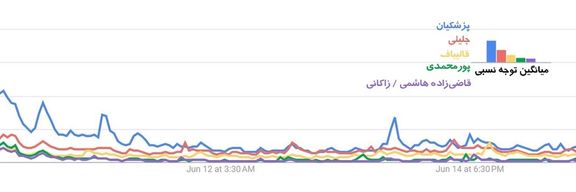
The first Google Trends graph shows a comparison of Google searches of the six candidates' names made by users in Iran from the afternoon of Sunday, June 9, 2024, to the afternoon of Sunday, June 16, 2024, local time.
The search terms include the names of the six candidates in Persian and color-coded in the graph: Masoud Pezeshkian (blue), Saeed Jalili (red), Mohammad Bagher Ghalibaf (yellow), Mostafa Pourmohammadi (green), Amir-Hossein Ghazizadeh Hashemi (purple) and, Alireza Zakani (purple). Given that Google Trends only allows for up to 5 groups of terms at a time Ghazizadeh and Zakani are marked in purple.
In the first hours following the official announcement of the six presidential candidates, the sole 'reformist' candidate Masoud Pezeshkian emerged as the most searched candidate among Iranian users. He was initially followed by Mostafa Pourmohammadi, with Saeed Jalili and Amir-Hossein Ghazizadeh Hashemi trailing behind, and Mohammad Bagher Ghalibaf and Alireza Zakani coming last in search interest.
However, within two hours, Pourmohammadi was overtaken by Jalili. Over the subsequent seven days, except for certain hours, Pourmohammadi remained in fourth place.
As the initial surprise over Masoud Pezeshkian's candidacy subsided, the gap between him and Saeed Jalili in search interest gradually narrowed. Despite this, Pezeshkian continued to attract more attention overall compared to the other candidates. The peak of searches for Pezeshkian occurred at midnight on June 13, when his appearance on state TV significantly boosted his Google searches.
This pattern of heightened interest following television appearances was observed with other candidates as well. When candidates addressed specific topics on TV, it noticeably influenced the trends of Google searches. This trend is stronger in the case of Jalili and Ghalibaf than in the other three candidates (Pourmohammadi, Ghazizadeh Hashemi, and Zakani).
Provincial Breakdown
The national average (Iran) shows that during the past week, Masoud Pezeshkian leads with a significant 43% of search interest, followed by Saeed Jalili at 23%. Mohammad Bagher Ghalibaf maintains a moderate level of interest with 13%, while Mostafa Pourmohammadi, Amir-Hossein Ghazizadeh Hashemi, and Alireza Zakani receive lower percentages of 9%, 7%, and 5% respectively.

Masoud Pezeshkian is more popular in the northern and western half of the country in West Azerbaijan Province and Ilam Province, and it is only in the provinces of South Khorasan and Qom that Saeed Jalili has attracted more attention by a small margin. Interestingly, the share of search results to the other 4 candidates (Ghalibaf, Pourmohammadi, Ghazizadeh Hashemi, and Zakani) in the provinces of the country does not show a specific and decisive difference.
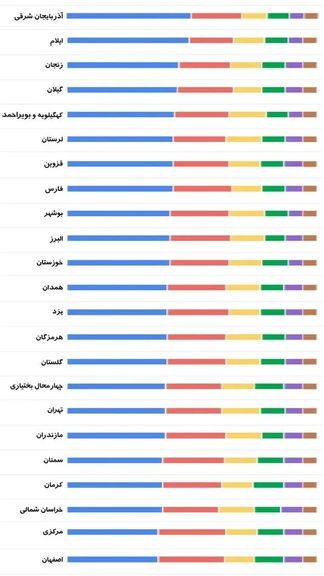
Examining non-scientific polls from prominent Telegram channels reveals varying degrees of candidate support and voter engagement. Pezeshkian consistently leads in several of these online polls. Saeed Jalili also maintains a strong position. Mohammad Bagher Ghalibaf also emerges prominently in Telegram polls with substantial subscriber bases.
"Do You Know Magazine” Telegram Channel
The "Do You Know Magazine" entertainment Telegram channel, with over 2 million users, conducted a now-deleted non-scientific poll that garnered 64,156 votes. According to the poll results, 71% of participants indicated they would vote for none of the candidates. Among those who expressed a preference, Masoud Pezeshkian received 11% of the votes, followed by Saeed Jalili at 10%, Mohammad Bagher Ghalibaf at 5%, Amir-Hossein Ghazizadeh Hashemi at 2%, Alireza Zakani at 1%, and Mostafa Pourmohammadi did not receive any votes.
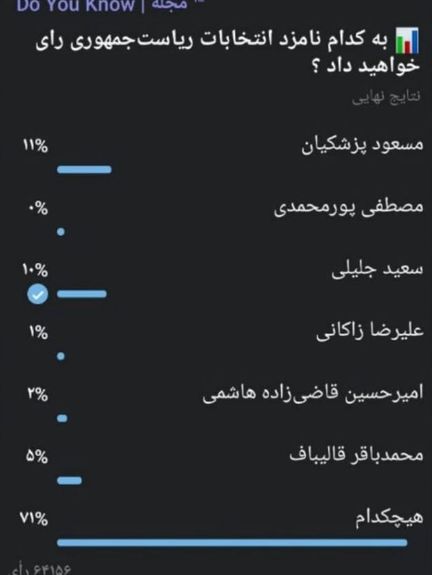
Akharin Khabar
Akharin Khabar’s Telegram channel, with over 2 million subscribers, conducted a poll with 143,669 participants. According to the results, Mohammad Bagher Ghalibaf leads with 32%, followed by Saeed Jalili at 28%. Masoud Pezeshkian garnered 19% of the votes, while Alireza Zakani received 3%. Amir-Hossein Ghazizadeh Hashemi and the "View Results" option, which displays the poll results without being a voting choice, each obtained 2% of the viewership. Mostafa Pourmohammadi did not receive any votes in the poll.
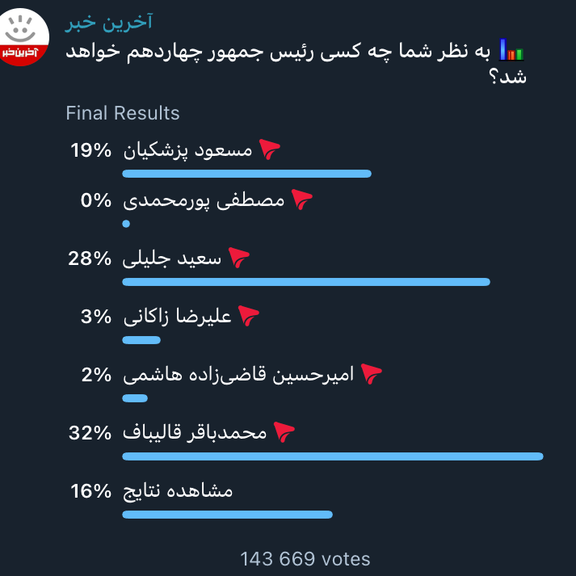
Khabar Farda
Khabar Farda, a Telegram channel with 780,000 subscribers, conducted a poll with 45,747 participants. The results show Masoud Pezeshkian leading with 27%, followed by Mohammad Bagher Ghalibaf with 16%, and Saeed Jalili with 10%. Amir-Hossein Ghazizadeh Hashemi received 2% of the votes, while Alireza Zakani and Mostafa Pourmohammadi did not receive any votes. Additionally, 45% of participants chose the "View Results" option, which displays the poll results without casting a vote.
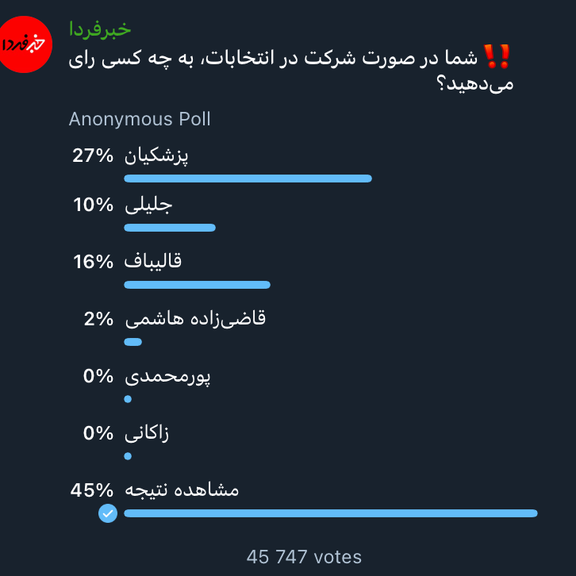
Khabar
Khabar, a news Telegram channel with 577,635 subscribers, conducted a poll with 23,940 participants. According to the results, Masoud Pezeshkian received a commanding lead with 64% of the votes, showcasing strong support among the channel's audience. Saeed Jalili followed with 20%, Mohammad Bagher Ghalibaf garnered 8%, Amir-Hossein Ghazizadeh Hashemi obtained 4%, while both Alireza Zakani and Mostafa Pourmohammadi received 2% each.
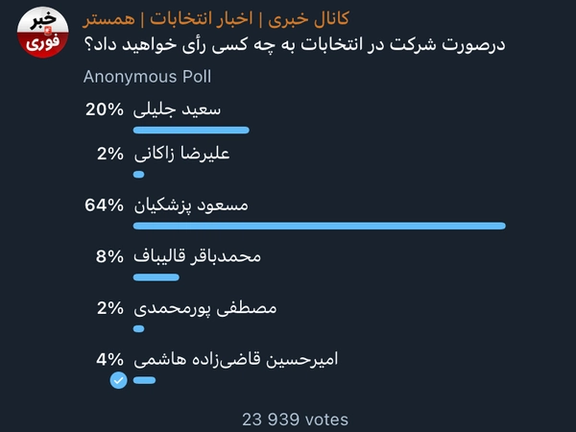
Masaf Institute
The controversial Masaf Institute, associated with a recent fraud and money laundering scandal and headed by ultra-hardliner politician Ali-Akbar Raefipour, conducted a poll on their Telegram channel, which has 183,990 subscribers. The poll received 65,734 votes, with the following results: Saeed Jalili received the highest support with 65%, followed by Masoud Pezeshkian at 19%, Mohammad Bagher Ghalibaf at 10%, Alireza Zakani at 2%, Amir-Hossein Ghazizadeh Hashemi at 3%, and Mostafa Pourmohammadi at 1%.
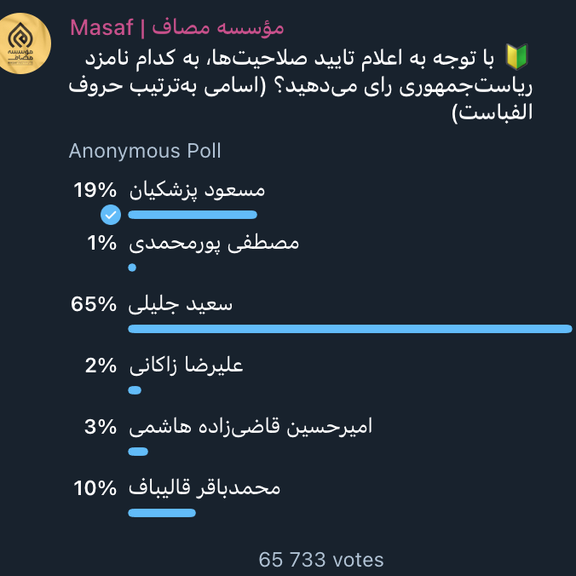
Efsha News
Efsha News, an entertainment news channel on Telegram with 184,774 subscribers, conducted a poll that garnered 25,594 votes. According to the results, 57% of participants indicated they would not vote, while Saeed Jalili received 19% of the votes and Masoud Pezeshkian 17%. Mohammad Bagher Ghalibaf garnered 4%, Amir-Hossein Ghazizadeh Hashemi received 2%, and Alireza Zakani obtained 1%. Mostafa Pourmohammadi did not receive any votes.
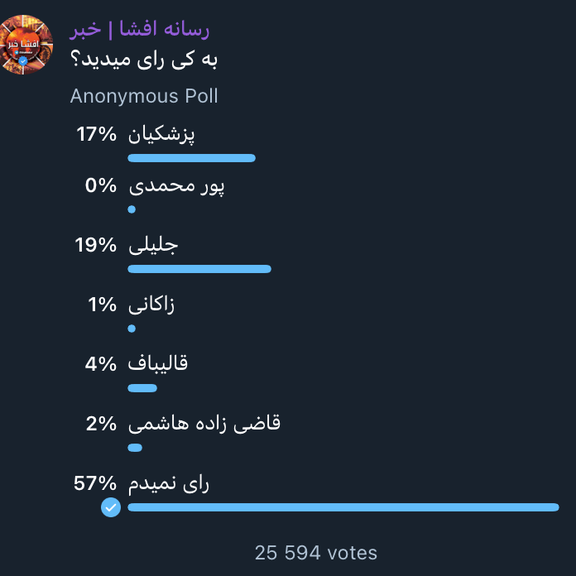
Entekhab News
Entekhab News, a 'reformist' newspaper with a Telegram channel boasting 155,410 subscribers, conducted a poll that garnered 70,099 votes. According to the results, Masoud Pezeshkian leads with 39% of the votes, indicating significant support among the channel's audience. Saeed Jalili follows closely behind with 36%, positioning him as a strong contender in the poll. Mohammad Bagher Ghalibaf received 7% of the votes, while Alireza Zakani, Mostafa Pourmohammadi, and Amir-Hossein Ghazizadeh Hashemi did not receive any votes. Additionally, 17% of participants indicated they have not yet reached a decision.
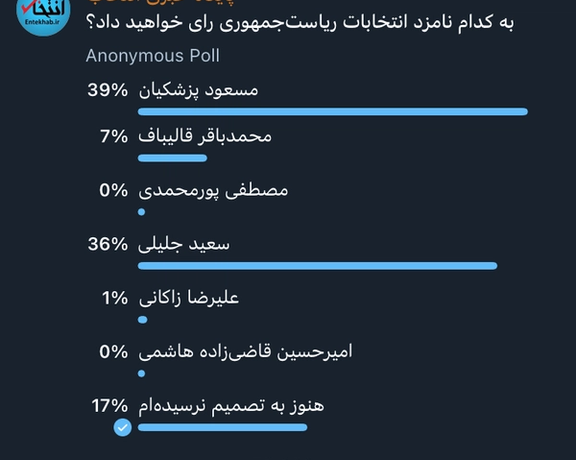
Donyaye Eghtesad
Donyaye Eghtesad (World of Economy), Iran's leading economic newspaper, on Telegram with 61,934 subscribers, conducted a poll that received 11,971 votes. According to the results, Mohammad Bagher Ghalibaf leads with 37% of the votes. Masoud Pezeshkian follows with 21%, while Saeed Jalili received 15% support. Alireza Zakani, Mostafa Pourmohammadi, and Amir-Hossein Ghazizadeh Hashemi did not receive any votes in the poll. Additionally, 27% of participants chose to view the results without casting a vote.
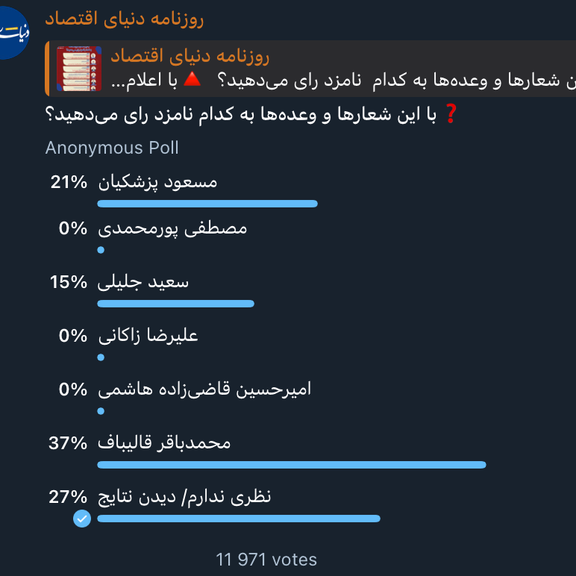
Presidential Election News Channel
In a poll conducted by this Telegram channel with 106,765 subscribers and 51,157 participants, Masoud Pezeshkian leads with 43% of the votes, followed by Mohammad Bagher Ghalibaf at 32%, and Saeed Jalili with 19%. Amir-Hossein Ghazizadeh Hashemi received 3%, Alireza Zakani 2%, and Mostafa Pourmohammadi obtained 1% of the votes.
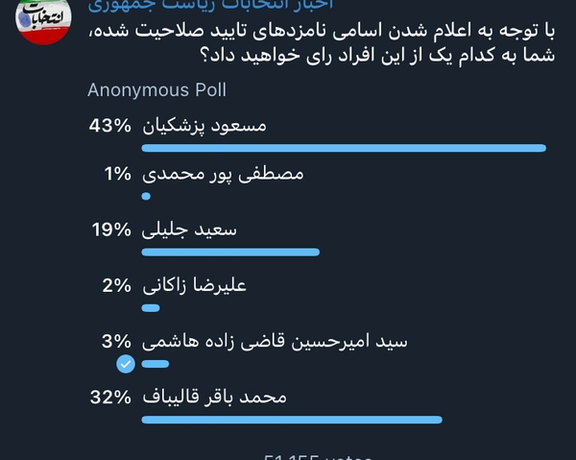
Shargh News
Shargh News, a prominent Telegram channel with 22,527 subscribers, conducted a poll with 11,597 participants. The results indicate that Saeed Jalili is the frontrunner with 30% of the votes, followed closely by Masoud Pezeshkian with 28%. Mohammad Bagher Ghalibaf garnered 22%, Alireza Zakani received 19%, Mostafa Pourmohammadi 1%, and Amir-Hossein Ghazizadeh Hashemi did not receive any votes.
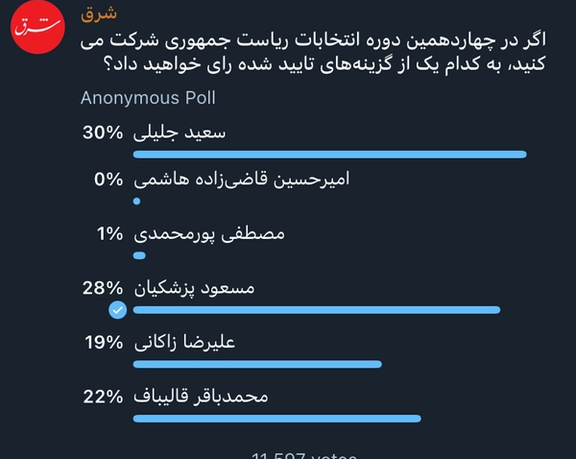
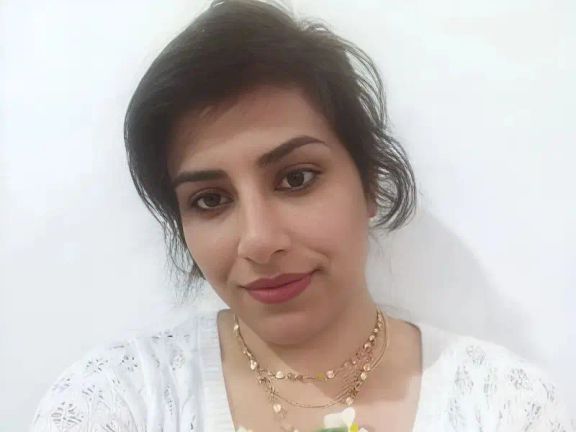
From the confines of Evin prison, political prisoner Mahboubeh Rezaei has slammed the upcoming presidential elections taking place against mass government opposition.
In a public letter, Rezaei said that “the Islamic Republic has no legitimacy, and this is a bet on the government's losing horse, repeating past mistakes.”
Since the 2022 uprising, Iran's government has faced the biggest legitimacy crisis since the founding of the Islamic Republic, with record unemployment, record poverty and mass social crackdowns on the populace.
She stated, "Once again, the Islamic government is seeking legitimacy by creating a choice between bad and worse, which has been the method of reformists for years".
Rezaei was arrested by security forces on May 22, 2023, and sentenced to 26 years in prison for "undermining national security" after supporting the Woman, Life, Freedom movement.
Golrokh Iraee, another political prisoner who criticized the government just a day earlier, called the encouragement to participate in the elections by reformists a "betrayal", though only one of the six candidates in the upcoming June 28 poll is from the reform camp, all others staunchly conservative allies of Iran's theocratic dictatorship.
Both prisoners argue that meaningful change is unattainable through the current electoral system, which they claim is rigged to favor the regime's interests to institute another ally of the ageing supreme leader, Ali Kahemenei.
Participation in the polls, called in the wake of the sudden death of President Ebrahim Raisi in a helicopter crash last month, is expected to hit record lows, similar to the March parliamentary elections. Unofficial reports estimate voter turnout to have been as low as 10 percent, with the last two presidential polls similarly low.